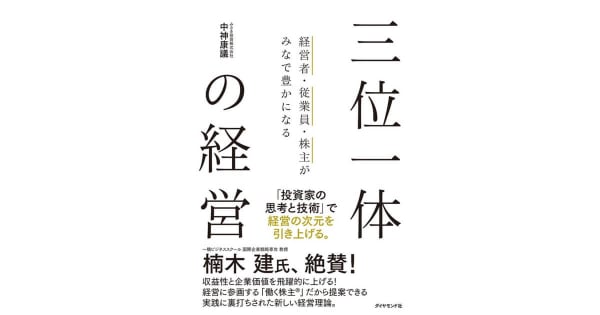Reading Notes: 'Trinity Management: Management That Enriches Managers, Employees, and Shareholders Together' by Koji Nakagami
I read ‘Trinity Management: Management That Enriches Managers, Employees, and Shareholders Together’ by Koji Nakagami (『経営者・従業員・株主がみなで豊かになる 三位一体の経営』中神康議(著)), so I’ll share the insights I gained from the book.
Background: VC's Recommended Reading / 背景 VC の方の推薦図書
A VC recommended this book to me, so I read it 📚
Below are quotes and notes from parts that left an impression on me.
Chapter 3: First Secure Sufficient Profit Margin — Business Economics / 第3章 まずは十分な利益率を確保する——事業経済性
All Businesses Can Be Classified into Four "Types" / すべての事業は四つの「型」に分類できる
While there are countless businesses in the world, there are only four "types" of "profit generation":
- Scale-type business (規模型事業)
- Distributed-type business (分散型事業)
- Specialized-type business (特化型事業)
- Dead-end-type business (手詰型事業)
(世の中に事業は星の数ほどあれど、「儲けの出方」には四つの「型」しかない)
Chapter 5: Prerequisites for Building Barriers — "Invested Capital" in Risks and Costs / 第5章 障壁づくりの必要条件——リスクとコストという「投下資本」
What Is the Greatest Obligation a Manager Must Fulfill? / 経営者が果たさないといけない最大の義務とは
"In Japan, for some reason, prudent management tends to be highly valued. However, prudent management is actually just a euphemism for 'cowardly management,' isn't it? Looking around, there are hardly any companies that have grown by advocating prudent management. I think companies cannot grow by just continuing to do the same things as in the past or the same things as other companies. I believe there is no 'success' at the end of the path that everyone takes."
(「日本ではなぜか、堅実経営が評価されがちです。しかし、堅実経営というのは実は、『臆病経営』を言い換えているだけではないでしょうか。堅実経営を唱えて伸びた会社なんて、周りを見渡してもほとんど見当たりません。会社は過去と同じこと、他社と同じことを続けるだけでは成長できないのだと思います。誰もが行く道の先に『成功』の文字はないと思うのです」)
💡 Prudent management is cowardly management (堅実経営は臆病経営)
Marginal investment decisions — this is exactly what a manager's job is. The reason why managers are not overwhelmed by daily operations, can earn high salaries, and must have relatively relaxed time is justified solely by this one point: making crucial judgments that are completely different from other companies in the industry.
(ギリギリの投資判断、これこそが経営者の仕事です。経営者が日々の業務に忙殺されるわけでもなく、高い給料を食めて、しかも割とゆったりした時間を持てる(というか、持たなければならない)理由は、この、業界他社とまったく異なる乾坤一擲のジャッジメントを行うという一点によってのみ、正当化されているのではないでしょうか。)
💡 Want to make marginal investment decisions in management without being overwhelmed by daily operations. (日々の業務に忙殺されることなく、経営におけるギリギリの投資判断をしていきたい。)
Chapter 7: Building a System for Risk-Taking — Winner's Curse 1: Group Decision Making / 第7章 リスクテイクに向けた体制をつくる——勝者の呪い1 集団意思決定
Japanese Companies Still Haven't Developed Group Decision-Making Techniques / 日本企業はいまだに集団意思決定の術すべを開発できていない
Japanese companies build robust business hypotheses and barriers during the entrepreneur/owner-manager era (first stage), achieving high "returns." However, as they progress through development stages to the non-founder manager era (second stage) and salaried manager era (third stage), they become unable to make bold risk-taking decisions, the barriers they built collapse, and as a result, they rapidly lose returns, far from "compound management"...
(日本企業は起業家・オーナー経営者時代(第一段階の時代)では骨太な事業仮説で障壁を構築し、高い「利回り」をたたき出す。しかし非創業家経営者時代(第二段階)、そしてサラリーマン経営者時代(第三段階)と発展段階を進むにつれ果断なリスクテイクができなくなり、せっかく築いた障壁も崩れ、結果として利回りを急速に落とし、「複利の経営」どころではなくなる……。)
💡 The key is whether risk-taking is possible in any era (いつの時代でもリスクテイクできるかが鍵)
The stronger the barriers that founding managers create, the more their successors become complacent with those barriers and stop taking bold risks — here we see the "winner's curse."
(創業経営者が強靭な障壁を作れば作るほど、後輩たちはその障壁に安住し、果敢なリスクテイクをしなくなっていく、という「勝者の呪い」がここに見えてくる)
💡 What assets should be left to the company? Assets, not wanting them to become a winner’s curse. (会社に残すべき資産は? 資産ではなく、勝者の呪いにしたくはない。)
Prerequisites for Taking Group Risk — Management Team Follows CEO's Command in Principle / 集団でリスクを取る必要条件——経営陣は原則CEOの指揮命令に従う
However, I think it's essential for executive teams, especially in third-stage companies, to understand the weight of responsibility entrusted to the CEO and have an agreement to follow the CEO's command unless there are exceptional circumstances. Without strong authority, it's impossible to boldly take risks under uncertainty and limited information.
(しかし、特に第三段階企業の執行チームには、CEOが付託されている責任の重さを理解し、よほどのことがない限りはCEOの指揮命令に従うという取り決めが不可欠なのだと思います。強大な権限なしに、不確実性や限られた情報のもと、敢然とリスクを取ることなど、はなからできない相談なのです。)
💡 Basically follow CEO’s command. (基本的にCEOの指揮命令に従う。)
How Independent Outside Directors Should Behave 1: Divide M&A Decision Making / 独立社外取締役のふるまい方1 M&Aの意思決定を分業する
**Supervisory Perspective — Always Maintain Systems**What’s more important from a supervisory perspective is always promoting the establishment of unified business views, setting M&A domains, and organizing systems, structures, and processes for examining M&A cases. Due to the nature of M&A, once a case emerges, conclusions must often be reached without delay, so there’s no time to discuss business views and examination systems that form the basis of case judgment.
(監督の視座——常日頃から体制を整備しておく
監督の視座でより重要なことは、常日頃から事業観の統一やM&Aドメインの設定、M&A事案を検討するための組織・体制・プロセスの整備を促しておくことです。M&Aはその性質上、いったん案件が出てきたら時間を置かずに結論を出さなければならないことが多いので、案件判断の前提となる事業観や検討体制を議論している時間がないからです。)
💡 Want to do daily M&A simulation training to enable instant decisions. (常日頃からM&Aのイメトレをして、即断できるようにしたい。)
**Executive Perspective — Drive Home Points About Post-M&A**One of the companies once said to be the best at M&A in the world is GE. I heard this directly from GE, but apparently each of GE’s business division heads always maintains a list of companies they want to buy (Wish List), constantly calculating and revising the value of these companies and prioritizing them. When prices become too high, they lower the priority; when they become cheaper, they raise it.
(執行の視座——ポストM&Aのあり方について釘を刺す
かつて世界で一番M&Aがうまいと言われてきた会社の一つがGEです。これはGEの方から直接聞いた話なのですが、GEの各事業部門のトップは、常日頃から買いたい企業の一覧(Wish List)を持っていて、それらの企業の価値をいつも算定・改定し優先順位付けをしているそうです。価格が高くなりすぎたら優先順位を下げ、安くなってきたら上げます。)
💡 Want to create and maintain M&A Wish List. (M&A Wish List を作成・メンテナンスしていきたい。)
Final Chapter: Fastest Way to "All Become Rich" — Trinity Management / 終章 最速で「みなで豊かになる」——三位一体の経営
Step 2: Understand Investors' "Thinking" and Get a Check-up / ステップ2 投資家の「思考」を理解し、診察を受けてみる
When evaluating companies, one of the things that serves as a camera is... the eyes of institutional investors. Objective evaluation without favoritism often draws resentment from within the company saying "outsiders who don't know the reality give such harsh evaluations," but usually the institutional investors are right and we are being lenient.
(会社の評価の際、カメラの役割をするものの一つは、……機関投資家の目である。贔屓目無しの客観評価には、……社内から「実態を知らない連中がこんな厳しい評価をするなんて」と恨み節が出るが、大抵は機関投資家が正しく、自分達が甘いのだ。)
💡 Objective view of company evaluation (会社の評価の客観視)
That’s all from the Gemba on wanting to pursue trinity management.
